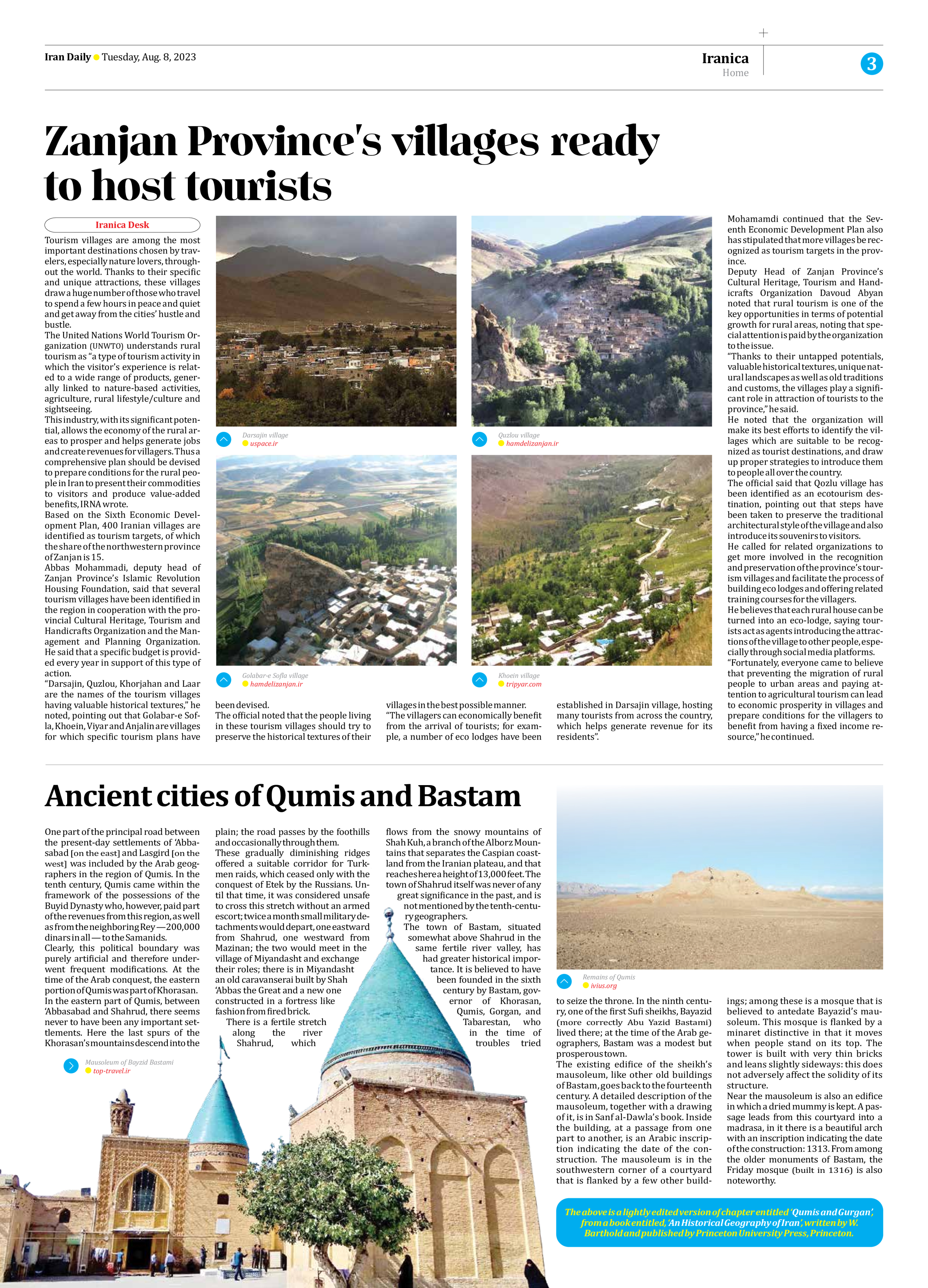
Zanjan Province’s villages ready to host tourists
Tourism villages are among the most important destinations chosen by travelers, especially nature lovers, throughout the world. Thanks to their specific and unique attractions, these villages draw a huge number of those who travel to spend a few hours in peace and quiet and get away from the cities’ hustle and bustle.
The United Nations World Tourism Organization (UNWTO) understands rural tourism as “a type of tourism activity in which the visitor’s experience is related to a wide range of products, generally linked to nature-based activities, agriculture, rural lifestyle/culture and sightseeing.
This industry, with its significant potential, allows the economy of the rural areas to prosper and helps generate jobs and create revenues for villagers. Thus a comprehensive plan should be devised to prepare conditions for the rural people in Iran to present their commodities to visitors and produce value-added benefits, IRNA wrote.
Based on the Sixth Economic Development Plan, 400 Iranian villages are identified as tourism targets, of which the share of the northwestern province of Zanjan is 15.
Abbas Mohammadi, deputy head of Zanjan Province’s Islamic Revolution Housing Foundation, said that several tourism villages have been identified in the region in cooperation with the provincial Cultural Heritage, Tourism and Handicrafts Organization and the Management and Planning Organization. He said that a specific budget is provided every year in support of this type of action.
“Darsajin, Quzlou, Khorjahan and Laar are the names of the tourism villages having valuable historical textures,” he noted, pointing out that Golabar-e Sofla, Khoein, Viyar and Anjalin are villages for which specific tourism plans have been devised.
The official noted that the people living in these tourism villages should try to preserve the historical textures of their villages in the best possible manner.
“The villagers can economically benefit from the arrival of tourists; for example, a number of eco lodges have been established in Darsajin village, hosting many tourists from across the country, which helps generate revenue for its residents”.
Mohamamdi continued that the Seventh Economic Development Plan also has stipulated that more villages be recognized as tourism targets in the province.
Deputy Head of Zanjan Province’s Cultural Heritage, Tourism and Handicrafts Organization Davoud Abyan noted that rural tourism is one of the key opportunities in terms of potential growth for rural areas, noting that special attention is paid by the organization to the issue.
“Thanks to their untapped potentials, valuable historical textures, unique natural landscapes as well as old traditions and customs, the villages play a significant role in attraction of tourists to the province,” he said.
He noted that the organization will make its best efforts to identify the villages which are suitable to be recognized as tourist destinations, and draw up proper strategies to introduce them to people all over the country.
The official said that Qozlu village has been identified as an ecotourism destination, pointing out that steps have been taken to preserve the traditional architectural style of the village and also introduce its souvenirs to visitors.
He called for related organizations to get more involved in the recognition and preservation of the province’s tourism villages and facilitate the process of building eco lodges and offering related training courses for the villagers.
He believes that each rural house can be turned into an eco-lodge, saying tourists act as agents introducing the attractions of the village to other people, especially through social media platforms.
“Fortunately, everyone came to believe that preventing the migration of rural people to urban areas and paying attention to agricultural tourism can lead to economic prosperity in villages and prepare conditions for the villagers to benefit from having a fixed income resource,” he continued.







